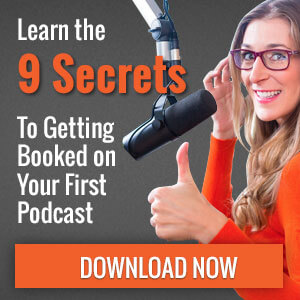Podcast interview marketing is one tool in a marketer’s tool box – or anyone wanting to reach a new audience. Having the host of a podcast interview you, bringing your message to their audience, can prove powerful for many folks. You get to tap into the trust the host has built with their audience, gaining credibility with a group of people with which you previously had no ties. However, getting an interview on podcast shows isn’t just a matter of snapping your fingers.
If you’re ready to address a new audience and turn listeners into leads, you need to understand the 7 secrets to getting an interview on podcast shows.
1 – Have a message
Podcast interviews should be more than an ego trip. Sure it feels great to have a host call you a subject matter expert. Offering stories and anecdotes to an audience does wonders for an ego. However, if you have no message, you have no real reason to book an interview on a podcast.
Your message could include offerings to an audience of further help. For instance, if you created a great program for using Facebook marketplace to re-sell goods, you might have an ebook or online course you sell to help others take the same step. Maybe you wrote a sales book and you can offer a free chapter for a download, an infographic and a free consultation call (which can turn into consulting clients).
Your message is more than stories. It’s the value you bring to an audience. You will want to focus your message so it’s deliberate.
2 – Know your market
Define your ideal customers. You may be able to hone in on a specific, powerful niche hungry for your message. Understanding the market ready for your message is vital.
Knowing your market is deeper than demographics. More than just statistical data relating to the population and particular groups within it, you’ll want to know behavioral information and the “story” behind your audience. You’ll want to define your buyer persona.
While demographics are valuable information (such as age, gender, income, education level, career, marital status), creating a buyer persona will help you dive into psychographics. Understanding people according to their attitudes, aspirations, and other psychological criteria helps to round out their story, honing in on behaviors like where they take in information.
3 – Prospecting the perfect podcasts
Knowing your market (buyer persona) helps you match your ideal customer with the right medium for information. In other words, where do your ideal customers find out about you? For many businesses, their ideal clients are already listening to podcasts. Understanding the shows they’re listening to can help you not only get featured, but also speak their language/lingo on those shows.
The better you understand your buyer persona, the better you can prospect the right podcasts. Getting an interview on podcast shows that include your perfect buyer persona will help you develop a wider audience where you can spread your message.
PRO TIP: Learn how to pitch podcasts here.
4 – Your machine
What you bring to the table is important to podcast hosts. They want to expand their audience, which means your social media and digital presence is vital to their listenership-building. Having a presence on Facebook, Twitter, LinkedIn, Instagram or other similar channels helps build your network, while it shows the hosts that you’re a legitimate guest that can help deliver new listeners. It’s a win-win scenario.
Having a machine also helps ensure greater success for you, as it builds your audience over time, delivering leads for your message we went over earlier. Without a website and social media presence, you may as well go back to door-to-door sales for your message. Since nearly everyone uses the internet for commerce and/or research today, and podcasts are online as well, ignoring the digital sphere is unwise.
5 – Become a laser-focused introduction machine
Once you’ve decided on the message, your market and the kinds of podcasts you want to introduce yourself to, it’s time to focus. Building your network will help begin the process of finding out where your ideal audience is listening, and help you to connect to those hosts. Focus also means that while you want to get on as many podcast interviews as possible, you’ll also want to consider whether they have your ideal audience.
Crossover audiences are great and should also be considered – like when you entrepreneur-focused message resonates with stay-at-home parents – but be wary of getting on podcasts with no ties to your message. Stay focused on finding the ideal podcasts no matter the size, so you can (hopefully) build up to the biggest podcasts in your niche.
6 – Humility
Speaking of building… let’s be very transparent when talking about podcast interview marketing. Yes you’re a big deal, but be humble and understand that not everyone knows you or trusts you yet. Living in a confident humility is possible. Knowing you have a positive message to share and having confidence in your abilities can coexist with understanding that not every host has heard of you. With 7 Billion people in the world, not everyone knows your story.
Building your reputation in the real world takes time as you know. The same is true for the digital part of life – like podcasts. The biggest entertainers in the world didn’t start on the biggest stages. Sometimes it takes years to be an overnight success. When looking for ideal podcasts, keep your dream shows in mind as you build your portfolio, but be sure to build with purpose and patience.
7 – Patience, grasshopper
This brings us to the last secret to getting an interview on podcast shows: patience. It takes time and effort to build a podcast interview marketing machine. This won’t happen overnight. However, as Aaron Walker found out, it can take off quickly with the right mix of work and connections.
Here’s to the journey of podcast interviews and spreading your message!
image source: secret


